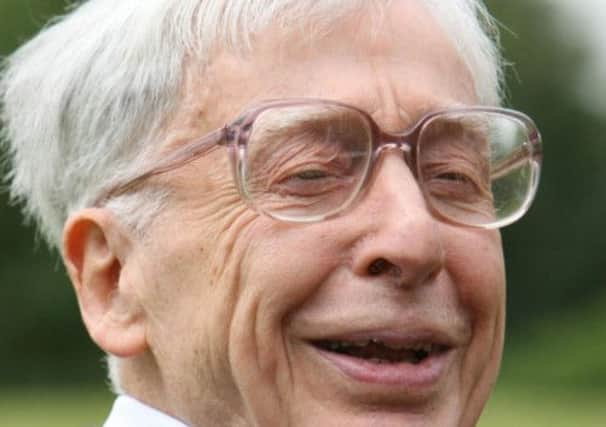Jayne Dowle: A great man who proved what can be possible


He was not an especially famous person; usually it is his colleague Dr Patrick Steptoe who is mentioned when the birth of Louise Brown, the first “test-tube baby” is discussed.
Quietly though, Sir Robert represents a one-man lesson in social mobility. He proves what can be done, but sadly, he makes us question what might be happening if he had been born 70 years later. Can you imagine the current odds on the son of a railway labourer and a mill worker from Batley going on to achieve not only a knighthood, but international recognition as a medical pioneer, culminating in a Nobel Prize for physiology/medicine? Never mind spurious arguments over Mary Seacole versus William the Conqueror, it is people like Sir Robert Edwards who should be held up as role models in our schools.
Advertisement
Hide AdAdvertisement
Hide AdTo give their three sons the best education they could find – and afford – the Edwards family moved to Manchester, where the boys all obtained scholarships to attend Manchester Central High School for Boys. The next time you hear a politician banging on about equal opportunities in education, picture the Edwards brothers at grammar school in the 1930s, seizing the chance to rise above the austerity of that time through study. I suspect that none of them ever forgot the sacrifices that were made to help them make the most of this opportunity. For five years, Sir Robert served as a local Labour councillor in Cambridge, where he lived, so that tells you something about his understanding of equality.
Military conscription and active service in Palestine in the Second World War interrupted his academic studies. Back then, young men like “Bob” accepted their lot and got on with it. Imagine this happening today. The next time a teenager moans to me about being under too much pressure, I’m going to remind them that for some young people, pressure meant being forced to leave home, leave school, and go abroad to fight and possibly die, for their country.
By the time Sir Robert ended up at university in Bangor in the early 1950s he was a mature student, and suffered academic ignominy when he achieved only a pass in his zoology degree. The story goes, however, that his talent for research was picked up by a professor who took him on for a PhD at Edinburgh University. From here, he developed his passion for human reproduction, eventually achieving the birth of Louise Brown by assisted conception in July 1978. His setbacks and professional challenges certainly give context to our own little workplace traumas.
I never met Sir Robert to find out how he felt about his extraordinary life, but I wish I had. I just heard him speaking in an old interview clip on the television news report of his death, and it was his Yorkshire accent which caught my ear. I shouldn’t be surprised to hear a distinguished clinician speaking with our flat vowels and understated delivery, but I admit I was. It stood out, and my immediate reaction was, “but he’s from Yorkshire”.
Advertisement
Hide AdAdvertisement
Hide AdShameful, I know, but how often do we hear a doctor, or a politician or a newsreader for that matter, talk with anything but standard London/South East tones? I hate clichés such as “humble Yorkshireman” because that’s just lazy pigeonholing, but I give three cheers for a man who inspired the whole world but never forgot where he was born.
His death should not only cause us to pause and think about his life, but also to consider what kind of life we live ourselves. Do we assume barriers where there are none? Feel intimidated by the limits which others might place upon us? Constrain ourselves by tough circumstances? And if we do any or all of the above, do we pass on these fears to our children? I say that from now on, we should take inspiration from Sir Robert, remembered by colleagues as a maverick whose speciality was not following accepted procedure but thinking outside the box. I’d like to think that this was the cussed Yorkshire in him coming out.
Last year, a tree was planted in Batley in proud commemoration, amid calls for Sir Robert Edwards’ name to be added permanently to the ranks of great Yorkshiremen. He was that and more besides; a doctor who did so much to help others, a proud father of five daughters himself, and a man who proved, in more ways than one, that anything is possible if you set your mind to it.
According to one obituary, his work was motivated by his own belief that “the most important thing in life is having a child.” Whether you agree with him or not, you cannot disagree that his own life remains a shining example of human achievement. One we can all learn from.